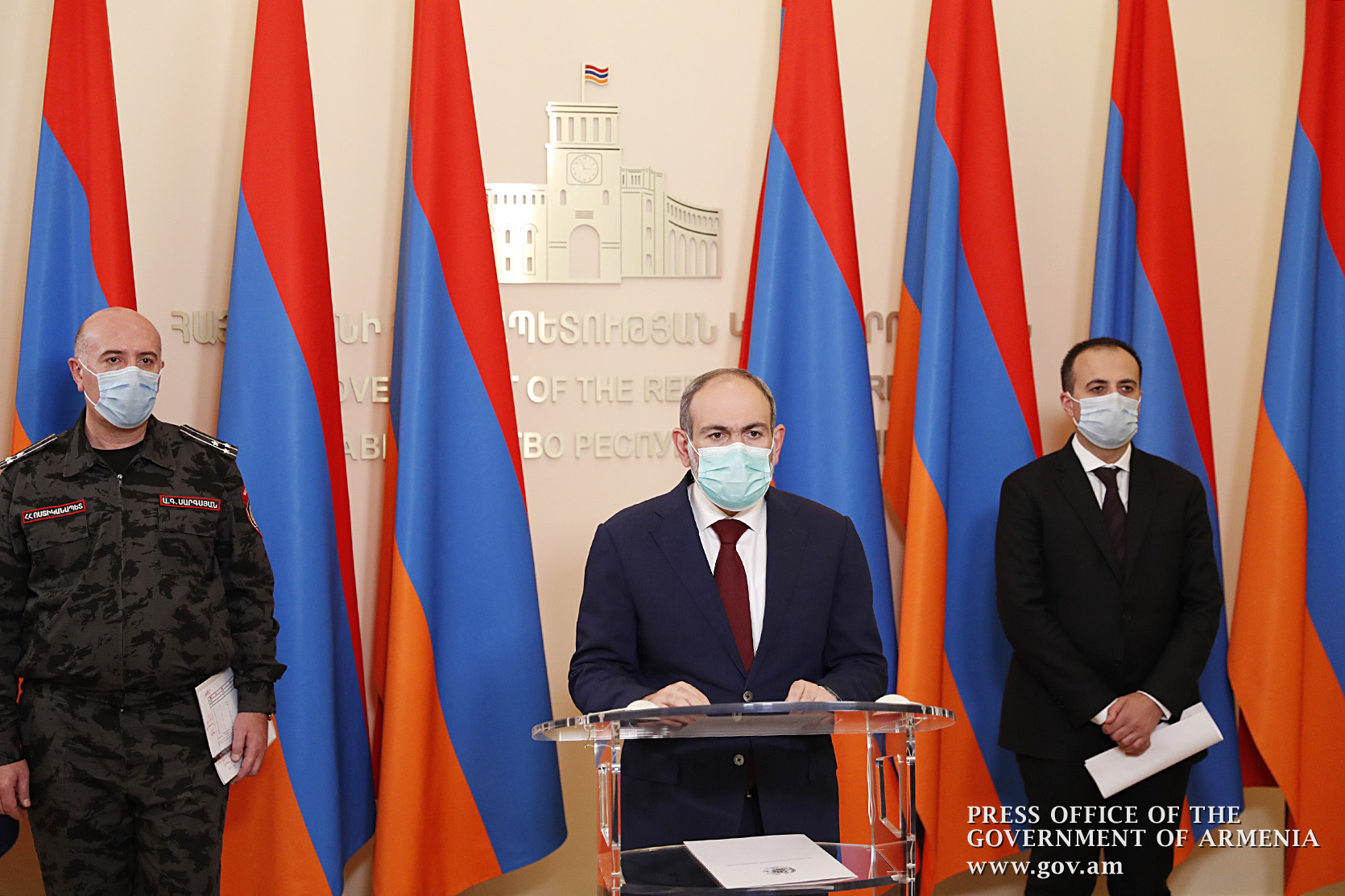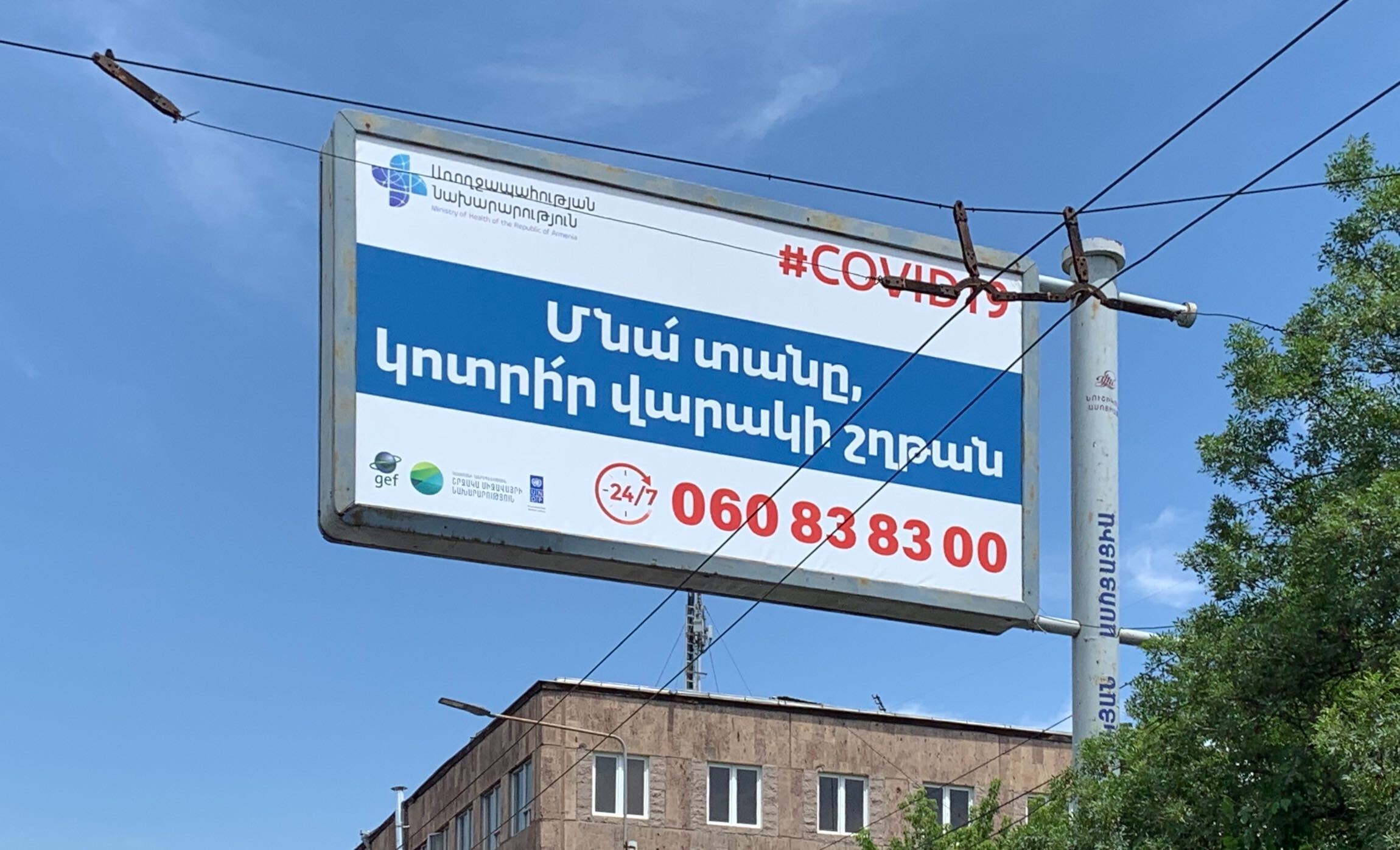YEREVAN—Armenian Prime Minister Nikol Pashinyan confirmed, on Monday morning, that he had tested positive for COVID-19. His wife Anna Hakobyan and three children have also tested positive. The Prime Minister says he will continue to fulfill his duties in self-isolation at his official residence until he and his family make a full recovery. Ironically, June 1 is also Pashinyan’s birthday; he turns 45 years old.
In a Facebook Live broadcast, Pashinyan explained that he had been performing regular temperature checks every morning before going to work as well as regular COVID-19 tests, but that didn’t prevent him from contracting the virus during one of his work-related meetings. Pashinyan added that he was quite certain of how he got infected. “During one of these meetings, I remember carelessly picking up a used glass on the table without gloves which hadn’t been replaced despite my previous instructions,” he recalled. The Prime Minister added that the staff member in charge of setting up the meeting rooms, which includes placing water glasses, has tested positive for the virus as well.
Pashinyan insisted that he did not have much exposure to then re-infect other people since the test was performed quickly at which point he immediately went into self-isolation. However, he blames himself for transmitting the virus to his family.
Pashinyan is one of very few global political figures who have been infected with COVID-19 since the pandemic began. Other politicians including Israeli Health Minister Yaakov Litzman, the head of Germany’s Christian Democratic Union party Freidrich Merzl, Australian Minister for Home Affairs Peter Dutton and Kentucky Senator Rand Paul have all tested positive and recovered. Italian mayor Giorgio Valoti and two members of the Iranian parliament have sadly succumbed to the virus.
Among heads of state, Britain’s Prince Charles and Prime Minister Boris Johnson both recovered from the virus, as did Canadian Prime Minister Justin Trudeau’s wife Sophie, who caused a chain reaction of self-isolations across the Canadian government in the process. Russian Prime Minister Mikhail Mishustin tested positive, while rumors have persisted that President Vladimir Putin may have as well.
Two members of Pashinyan’s cabinet, Minister for Local Government Suren Papikyan and Health Minister Arsen Torosyan, had also undergone periods of self-isolation earlier last month when several staff members at their respective ministries were infected with the virus; however, neither of the ministers tested positive. In addition, at least one parliamentary staffer tested positive for the virus.
Pashinyan and Torosyan have become the public faces of the country’s ongoing struggle against the pandemic, providing daily live-streamed updates on the situation in addition to regular government briefings. Last week, the Prime Minister instituted new guidelines for all members of his government to wear face coverings and gloves at all times as an example to follow after receiving heavy criticism for appearing in photos of Artsakh President Arayik Harutyunyan’s inauguration ceremony. Pashinyan, for his part, has been using his considerable reach on Facebook to urge citizens to take the virus seriously and respect social distancing guidelines. He broadcasted himself walking through the streets of the Armenian capital, inspecting businesses for respecting the guidelines and asking citizens to keep their distance.
In the midst of a record-breaking rise in daily-new registered cases last week, Pashinyan, flanked by the recently-appointed police chief Arman Sargsyan, announced stricter enforcement procedures which would include immediate shutdowns of non-complying businesses, fines for citizens caught without face masks among other measures.

Over the weekend, The Armenian Weekly observed police checkpoints on highways leading into Yerevan, as well as in the cities of Echmiadzin, Medzamor, Sartarapat, Ashtarak and Proshyan. Police were seen ticketing motorists who weren’t wearing masks while traveling accompanied. Loudspeakers from Ministry of Emergency Situations vehicles could be heard across the country reminding citizens that social distancing may save hundreds of lives. On Friday, police announced that they had caught 15,241 violators of the State of Emergency rules, while health and safety inspectors suspended 1,156 business licenses for violating hygiene rules out of over 17 thousand inspections.
Despite renewed measures from the government’s side, Pashinyan warned once more that fake news stories claiming that the virus doesn’t exist, which have widely circulated among the population, as well as apathy are complicating efforts to manage the infection rates without returning to full lockdowns. In response to claims from critics that lockdown measures were lifted before all WHO criteria were met, the Prime Minister said, “The WHO’s recommendations are based on health criteria alone. Armenia, like many other countries, has to weigh those criteria against economic, security and social considerations. Many other states have opted to lift quarantine measures before hitting WHO targets as well.” According to him, experts insist that the pandemic remains manageable as long as social distancing measures are respected, and that proper mask-wearing by at least 70 percent of people could see the rate drop to near-zero.

The number of new cases—which had reached an all-time high of 460 last Wednesday—has seen a steady drop in subsequent days, with 210 recorded on Monday. It cannot be said whether this is the result of the new enforcement measures and widespread mask adoption yet. However, new recovery rates have likewise dropped with only 16 recoveries on the same day. Health Ministry spokeswoman Alina Nikoghosyan explained the recent drop in new daily recovery figures to the Armenian Weekly as resulting from a change in the system for discharging patients over the previous week. “Patients with few or no symptoms who don’t check in online with their assigned polyclinic in order to be discharged will be automatically cleared once the maximum 14-day period expires,” said Nikoghosyan. With the long weekend (hemmed in by Independence Day on May 28 and Children’s Day on June 1) over, Nikoghosyan expects the number of registered recoveries to jump as the system boots back.
Still, health workers warn that Armenia’s strained healthcare system is struggling to cope with the influx of new patients in critical condition. Almost 95 percent of the ICU beds at the Grigor Lusavorich Hospital, one of the largest such medical centers dedicated entirely to treating patients with COVID-19, are occupied. Nonetheless, the Health Ministry has been working to expand that capacity, with an additional 100 new wards expected to become operational this month, in addition to the 102 last week. Torosyan also announced a call to retrain additional medical personnel to deal with the crisis, with a special emphasis on anesthesiologists and resuscitation specialists.
One 47 year-old woman suffering from a number of pre-existing conditions including diabetes, ischemic disease and kidney failure, was among the patients to successfully beat the virus today. The staff at the Grigor Lusavorich Hospital announced that they had discharged her after 44 days in intensive care where she battled the coronavirus as well as bilateral pneumonia.
The country is also on the verge of deploying the first of its indigenously-developed and manufactured PCR (polymerise chain reaction) tests which had been ordered two months ago with a $500 million grant. These tests, designed to detect the presence of COVID-19 antibodies, are expected to help screen much larger swaths of the population. Provided with a much more accurate picture of the situation, health authorities could more efficiently direct resources towards contagion spots. Based on figures from other countries, Pashinyan publicly estimated that the real figure for infection is at least twice as high as the confirmed rate, with the virtual totality of those cases being asymptomatic. He further announced that first responders and other medical personnel are being compensated at three times their regular salaries for the duration of the emergency.


I hope his son is not infected. He serves militay duty with Artsakhi army!
His son has already completed his military service.
Pashinyan’s timing is off, we’ve moved on to the race riot phase